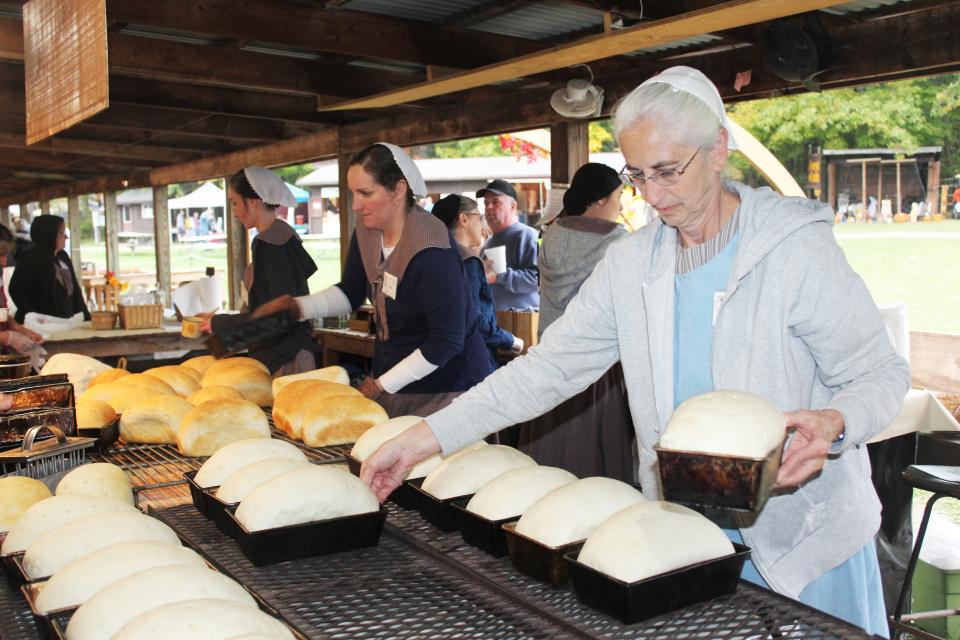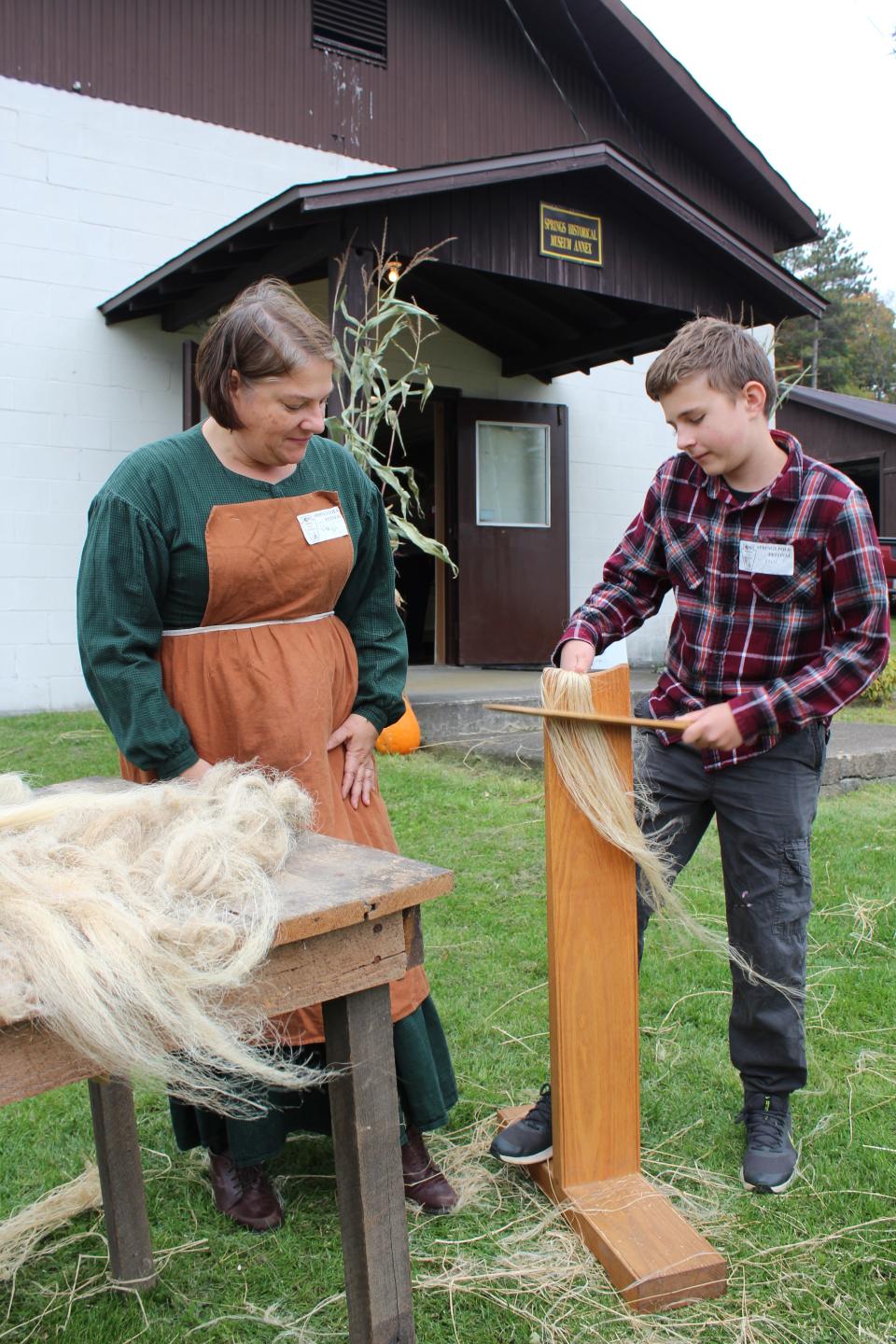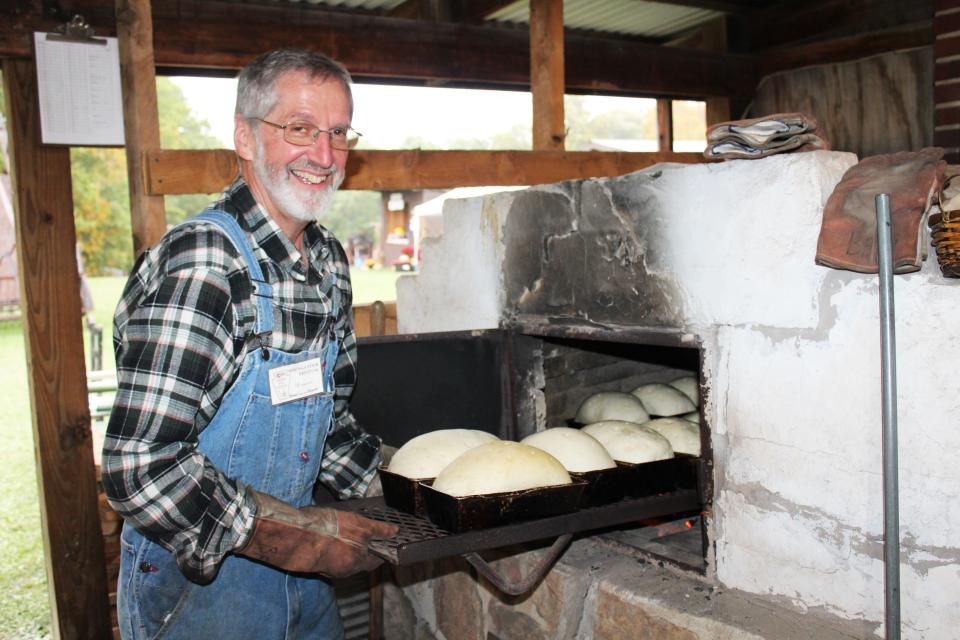65th annual Springs Folk Festival celebrates German cottage craftmen
SPRINGS ― The 65th annual Springs Folk Festival celebrates the history of German cottage craftsmen who dwelled in the mountains of southern Somerset County and Garrett County, Maryland.
The event set for Friday and Saturday will bring back the autumn glory of mountain-dwelling surrounded by country crafts.

"The Springs Folk Fest is like stepping back in time where the arts, skills and labors of our forefathers are celebrated and brought into view for the public. No matter what age you are, the folk fest creates memories for a lifetime," said Harriet Berg, who has been a longtime volunteer for the event.
From bread baking to weaving to log hewing and threshing grain and hayrides, the season comes alive all in one place for two days. Bluegrass and gospel music fill the air with the Springs Museum as the backdrop for the event.

Berg said the crews are working hard, spending many hours a day to update the facilities and prepare for the festival.
"The festival goers are eager to bring their children and grandchildren to learn and enjoy how our ancestors worked and played, just as they did when accompanied by their parents and grandparents," Berg said. "Many school groups have attended through the years, learning firsthand about local history. The sights, sounds and smells will linger in their memories as the antique farm equipment such as the hay baler rattle away and the clanging of the blacksmith tools on the iron creates sounds we no longer hear every day."
Festival brainchild
The festival was the brainchild of Dr. Alta E. Schrock – a woman like none other
Schrock (April 3, 1911 – Nov. 7, 2001) not only began the festival but also founded the Springs Historical Society, Springs Museum, Penn Alps Inc., Spruce Forest Artisan Village and a total of 17 philanthropic organizations. She became the first Mennonite woman to receive a doctorate in biology. Shrock was inducted into the Maryland Women’s Hall of Fame and Garrett County Hall of Fame.
In the Casselman Chronicles 1983, she writes of her memories of the festival in an article "I Had a Dream:"
"The Springs Folk Festival concept had its roots in my youth when I began to ask neighbors to save family heirlooms," she wrote.
Then, while talking with Tom Shenk in her residence in Goshen, Indiana, in the winter of 1957-58, she visualized with him "the gala event" and his eyes lit up with enthusiasm.
"The purpose of the proposed festival, I told Tom, was to preserve the best of our heritage of pioneer craftsmanship and the activities of farm, home and shop,” she wrote.
More: A love of community and history brings new curator to Springs Museum
Alta, being the type of person who acted upon her dreams, went from visualization to initiation very quickly.
She may have inherited some of her feelings for handcrafted equipment and items from her great-great-grandfather, Joel B. Miller, who was a master craftsman. He made almost every conceivable piece of equipment for the home and farm.
After several professorships and volunteer assignments after World War II in Germany, Alta returned home to Springs to organize her dream that developed into the Springs Historical Society, Springs Museum and the Springs Folk Festival.

According to the Casselman Chronicle 1983, the Penn Alps Board and the Springs Historical Society Board members appointed committees to plan the first event to be held Oct. 11, 1958. At least 100 people were involved in the preparations and serving of the Dutch dinner. During the day at least 2,000 guests, plus the large festival staff of workers and demonstrators, ate meals or had refreshments of some kind.
Vocal and instrumental music along with historic sketches and Pennsylvania German readings were a part of the program from the first festival.
The community supported the event by drying corn and apples, shredding cabbage for coleslaw, preparing apple sauce, (apples picked by local boys), cooking potatoes for the Dutch fries and baking cookies in their homes. Dishes were borrowed from the kitchens of local churches. The Dutch meal served today is very much the same menu but prepared with modern appliances.
As Schrock wrote in the Casselman Chronicles, “To the tune of the swinging flail, the rattling treadmill, the crash of the rail splitter’s axe, the clack of the flax brake, the hum of the spinning wheel, and the crackling of the open-kettle fires, the crisp sunny day with its high winds kept folks stirring and milling about the grounds.”
Springs community spirit
According to Berg, Alta felt the greatest success of the folk festival lay not in its number of guests, but in the demonstration of community spirit, in the mobilization of creative forces from Somerset to Oakland, Maryland, in the hard work done by local citizens to insure the success of the venture.
"Schrock and lifelong festival supporters Verda Yoder and Ralph Miller scoured the mountains and valleys for 'old-timers' who could use the early American tools we had in the museum," Berg said. "No stones were left unturned to trace down rumors that 'Uncle Joe' or 'Cousin John' could swing a mean broad-axe, dress puncheon floors, shave shingles or flair grain. They knew this breed was vanishing rapidly."
A heroic effort was made at the very first festival to provide as complete an offering as possible of pioneer demonstrations, along with a cross-section of contemporary arts and crafts. Antique farming equipment demonstrations have been added as the festival area grew larger.
More: PumpkinFest set for Oct. 6-8 in Confluence
Facility, demonstrators and artisans expansion
Over these 63 years as the facility expanded, lean-tos then tents then enclosed buildings were erected to house the growing number of demonstrators and artisans. Vocal and instrumental music was introduced in evening performances which developed into a full daytime music program presented in a music building as well as on a stage in the Forest Trail. In the 1970s, a pageant "Chestnut Roots" was created, telling the story of the area from its settlement in the 1800s through the 1900s. The two-story Springs Museum continued to evolve to provide a testament to times past.
"Over the years the volunteers, names too numerous to mention, were presented with many hurdles including inclement weather, fires and vandalism but the event continues on," Berg said.
In a short survey taken in 2005, it was recorded that people attended from 28 states and three countries.
The festival has been showcased in the "Baltimore Sun," Pittsburgh dailies, the "Good Housekeeping Magazine," "Carnegie Magazine," "New York Times," and "Life" magazine among others, as well as being supported by local newspapers. Internet advertising has been added in modern times.
One-of-a-kind shopping and food experience
The marketplace offers a one-of-a-kind shopping adventure – paintings, baskets, wood-crafted furniture, quilts and dulcimers with more than 100 juried artisans. There are many new demonstrations this year including fly tying and leather crafts.
The food at the festival will bring back memories for many as they sample kettle corn, Pennsylvania Dutch sausage meals, pancakes and sausage, bean soup, homemade bread baked in an outdoor kiln, doughnuts fried and many other items. Admission includes parking, entrance to the grounds and museum, music performances and demonstrations.
For more information go to the Springs Folk Festival page on www.springspa.org or call 814-442-4594. Also, follow the latest news and updates on Facebook.
This article originally appeared on The Daily American: Bread baking, log hewing and more at Springs Folk Festival

